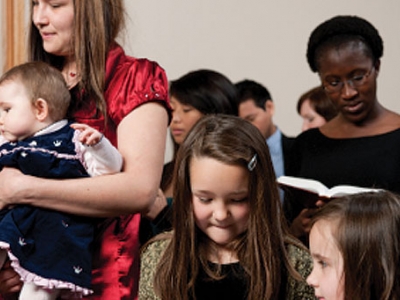
Changing the ‘maybe’ culture in our churches
What signal are you sending your children when you say 'maybe' to church, but 'yes' to everything else?
It seems to me that maybe pretty much always means no… (Jack Johnson, Flake)
In an over-full, over-committed life, it’s easy to just click ‘maybe’ on a Facebook event. The thought of making another decision about anything seems a little overwhelming, and ‘maybe’ seems a lot nicer than a flat out ‘no’. At the very least, it defers the rejection until you have the emotional fortitude to say it nicely. In the end, you wait until the absolute brink and bumble your way through “I am really sorry… the kids have been sick… the dog needs a kidney transplant… sorry… see you soon… it would be great to catch up…. I hope it goes well… sorry".
As the receiver of a ‘maybe’, what are you supposed to do with it? Do you set a place at the table, metaphorically or literally, for each ‘maybe’? Do you ignore the ‘maybes’ and invite a few more guests, hoping that ‘maybe’ really does mean 'no'. On the receiver side, no one likes ‘maybe’, so why do we keep doing it to each other?
The 'maybe' culture in our churches
Sadly, I think this ‘maybe’ culture has permeated into our church culture, and of particular concern for me is the influence it is having on our children’s and youth ministries. They become another event, another commitment, and as a parent they can feel like a lot of effort. We justify our absence by using the language of objective reality like “we can’t make it” instead of the language of choice, “we decided to go to the beach”.
Ultimately, we have become consumers of church. We expect ‘the church’ to put on a quality product, but we don’t believe we have any obligation to that product. Our children and youth are growing up with the false presupposition that being in Christ is somehow separated from our commitment to the body of Christ. This leaves church as little more than a helpful optional extra.
It all seems a long way from the biblical picture of what it means to be bound together in Christ.
so in Christ we, though many, form one body, and each member belongs to all the others…
Be devoted to one another in love. Honour one another above yourselves. Never be lacking in zeal, but keep your spiritual fervour, serving the Lord. Be joyful in hope, patient in affliction, faithful in prayer. Share with the Lord’s people who are in need. Practice hospitality. (Romans 12:5, 10-13)
In our individualistic culture, personal freedom has become paramount, and there is little consideration for how our self-chosen actions might impact other people. However, as Christians, Jesus calls us to see life in the context of the other - each member belonging to the other and looking out for the good of the other. As parents, it is our job to teach this to our children by example, by our words, through scripture and with the guidance of the Holy Spirit.
Let me suggest three things we are trying to do as a family, often with mixed success.
1) We love our children by being committed to our church family
We try to teach our children by our priorities, that Jesus is the most important thing in our life. We try to model it in our home and in our conversation and we model it as we gather each week to worship with the body of Christ. I know there are lots of things our children want to do, and as parents we want them to have every opportunity. However, what does it say when we can make it to nippers, swimming lessons, tuba lessons and soccer religiously, but church is the bridge too far?
2) We love our children by being committed to the children's ministry
I don’t know if you have ever been in a Bible study, where the group isn’t committed - it’s not exactly inspiring and the members rarely thrive. The same is also true for children’s and youth ministry. When groups have a highly committed core, we see the children and youth thrive, and we see the group grow in mutuality and love for each other. Christian parents sometimes feel their child is already supported at the Christian school and in the home, so they see church groups as a good supplement but not essential. In an individualistic paradigm, that might be true - but as Christians, we are called to belong to one another. The irony is, the outside parents are often more committed than the Christian parents.
Every week, our children have the opportunity to invite their friends, to love their peers and to use their gifts to God’s glory. Every week, our young leaders commit an enormous amount of time and effort to leading our children and youth in Christ. Their effort is often unseen and unappreciated and the least we can do as parents is get beside them as they love us and love our children.
3) We love the lost by being committed to the children’s ministry
When children or youth love their group, they become relentless evangelistic machines. On the other hand, if they don’t love it (especially youth), they will not waste valuable social capital on inviting a friend to something they think will be ‘lame’. For most churches, the children’s and youth ministry is the biggest evangelistic opportunity you have - and your children are right in the middle of it. Encourage them to be committed, pray with them about their friends, talk to the parents of their friends, and commit to making the most it.
I have a job outside of my church, I have three children and a wife, and it always seems easier to say ‘maybe’ than just straight 'no'. As tempting as it is, I need to start saying ‘no’ to some of the other good things in life, so I can say ‘yes’ to the really important things. That means I need to be prayerfully discerning about my choices and I need to be willing to sacrifice some of my individual freedom. In the end, I hope my choices will be an act of worship to God as I love and serve my family and His people.
For more articles from Growing Faith, subscribe to our monthly e-newsletter.
To hear about the latest books and resources from Youthworks Media, subscribe here.







